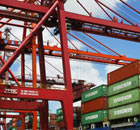World Business
Wall St tumbles on fear Greek crisis could spread
(Agencies)
Updated: 2010-05-05 11:53
 |
Large Medium Small |
NEW YORK - Investors dumped US stocks on Tuesday in Wall Street's worst session in three months on the fear that even with a bailout for Greece, Europe's debt crisis could spread to other weak euro zone countries.
The sell-off echoed a wave of fear that gripped financial markets as investors fretted the crisis in Europe could derail the global economic recovery. A gauge of investor fear jumped more than 18 percent.
Big exporters to Europe including technology and industrial companies tumbled, with Hewlett-Packard off 3.9 percent to $50.64 and Caterpillar Inc down 4.6 percent to $66.70.
"It looks like we've got some profit-taking on early-cycle exporters, companies with a big global presence over in Europe," said Fred Dickson, chief market strategist at D.A. Davidson & Co in Lake Oswego, Oregon.
Basic materials shares tumbled as the euro hit a one-year low against the US dollar. The Reuters-Jefferies commodity index and the S&P materials index both posted their worst day since early February, sliding 2.3 percent and 3.5 percent, respectively.
|
||||
The CBOE Volatility Index, Wall Street's so-called fear gauge, finished up 18.1 percent at 23.84 points, its highest closing level in three months.
Airline shares were hard hit, with the Arca Airline Index shedding 5.39 percent after a recent run-up.
Despite the S&P 500's steep fall, the benchmark did not break major technical support except for a short-term bottom at 1,181 on the S&P 500, the intraday low hit last week.
"For initial support most people are watching the 50-day moving average, which is at 1,168," said John Schlitz, chief US market technician at Instinet in New York.
Encouraging US economic data on manufacturing and housing failed to provide a floor to the market. Reports showed new orders received by US factories in March unexpectedly increased and pending home sales rose to a five-month high.
On the upside, better-than expected earnings from drug makers Merck & Co Inc and Pfizer Inc boosted those shares by about 2 percent each.
About 12 billion shares traded on the New York Stock Exchange, the American Stock Exchange and Nasdaq, more than last year's estimated daily average of 9.65 billion.
Declining stocks outnumbered advancing ones on the NYSE by a ratio of about 6 to 1, while on the Nasdaq, about 29 stocks fell for every five that rose.













